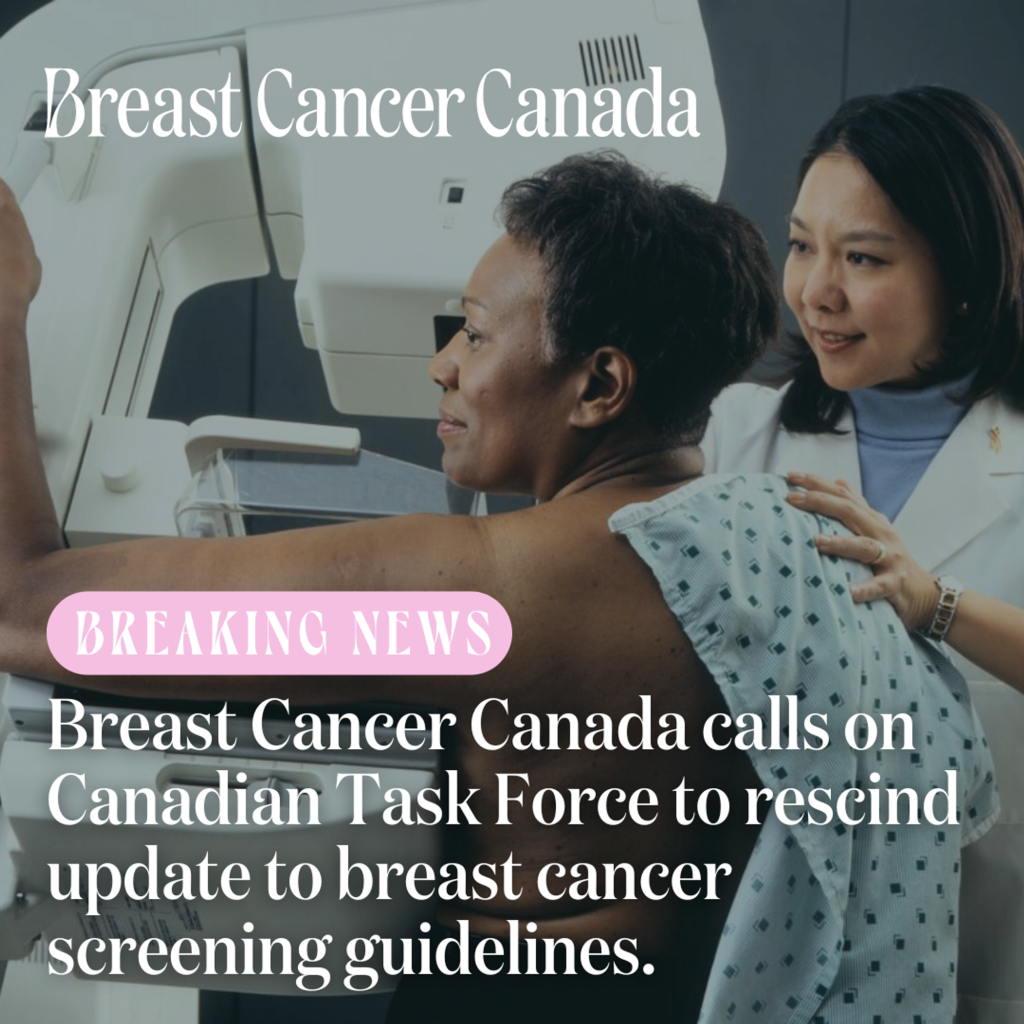New national breast cancer screening guidelines lack patient voice, clarity and distinction between screening and diagnosis
Breast Cancer Canada is deeply concerned by today’s guideline from the Canadian Task Force on Preventive Health Care regarding the routine age for breast cancer screening. Today’s recommendations from the Task Force contradict clear evidence and emerging trends that underscore the critical importance of early detection while also ignoring calls from the majority of Canadians to lower the screening age.
Provinces across the country have been lowering the age of screening to 40 over the past several months. The Minister Responsible for the Status of Women in Saskatchewan, who is a breast cancer survivor said she “knows firsthand how early detection and quicker diagnoses and treatments are vital to ensure better outcomes for breast cancer patients.” This aligns with Breast Cancer Canada’s national poll released in September highlighting that 89% of Canadians believe that routine screening should begin before the age of 50. Several provinces have since lowered their screening age.
Breast cancer incidence is on the rise in Canada. Increasing access to routine screening for women in their 40s is a starting point to prevention health equity across Canada. The goal of increasing access to routine screening is to detect breast cancer ahead of signs and symptoms presenting themselves. Early detection is paramount; it means less invasive treatment and significantly better outcomes for Canadians while reducing overall health system costs. Ignoring the data that supports screening starting at age 40 is a disservice to the 1 in 8 women who will be diagnosed with breast cancer in their lifetime.
“The task force’s decision to not advise routine screenings for women in their 40s fails to acknowledge the advancements in screening and detection and what research is showing us including the increase in early-age breast cancer over the past 20 years,” says Kimberly Carson, CEO of Breast Cancer Canada. “Early detection saves lives. The benefits of early detection and the opportunity to treat cancer before it advances, spreads, and becomes more complicated significantly outweigh the harms of mammograms as cited.”
“Unfortunately my breast cancer was more developed and had spread to my lymph nodes when I was diagnosed at age 46” Parminder Punia of Toronto shares. “Routine screenings beginning at age 40 would have meant my breast cancer might have been treated through removal of the tumor, not the entire breast. Patients could be spared the side-effects of chemotherapy and diagnosed before the cancer advances and invades other parts of the body.”
Breast Cancer Canada urges the Canadian Task Force on Preventive Health Care to reconsider their recommended guidelines. Several provinces, patient groups, and national associations have recognized the urgency of starting routine screenings at age 40. This is aligned with recent recommendations from the U.S. Preventive Services Task Force and reflects a growing consensus on the importance of early detection and intervention.
“While mammograms come with a margin of error, they remain our best line of defense,” explains Carson. “Public access to screening at a younger age and improvements in Canadian infrastructure for early detection of breast cancer are urgently needed.”
Please visit the Canadian Task Force website to access the full report: canadiantaskforce.ca
—
About Breast Cancer Canada
Breast Cancer Canada is a national charity dedicated to saving lives through breast cancer research. With a focus on precision oncology (personalized care), it is the only national breast cancer organization in Canada that has a clear mandate to raise money for research, and advocate and educate on the progress of new research evidence. The organization receives no government funding, meaning all research is funded through the generosity of donors and sponsors. For more information visit, breastcancerprogress.ca.
Media Contact
Anne-Marie Tremble | Account Manager
breastcancercanada@




